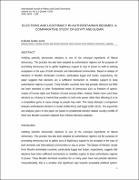Elections and Legitimacy in Authoritarian Regimes
Abstract
Holding periodic democratic elections is one of the principal ingredients of liberal
democracy. This practice has also been adopted by authoritarian regimes not for purposes of
promoting democracy but to gather legitimacy support to stay in power as well as seeking
acceptance in the eyes of both domestic and international communities. Based on dataset of
elections in Muslim dominated countries, particularly Egypt and Sudan, respectively, the
paper suggests that elections are a sufficient mechanism to mobilise support to keep
authoritarian regimes in power. These Muslim countries have had periodic elections but little
has been extended to other fundamental tenets of democracy such as freedom of speech,
respect of human rights and freedom of press among others. Instead, leaders have used these
elections as a license to market their position to hold onto power rather than allowing it to be
a competitive game to cause change as people may wish. This study attempts a comparison
between authoritarian elections in Sudan (1989-2011) and Egypt (1981-2011). The arguments
and analysis given in this paper are based on presidential election dataset country profile of
these two Muslim countries obtained from African elections database.
Collections
- Research Papers [9]

